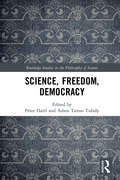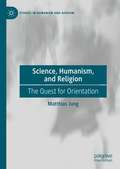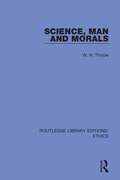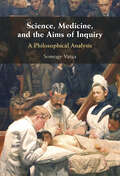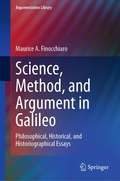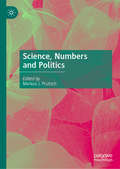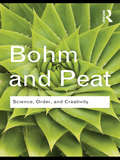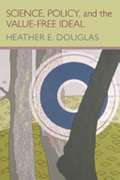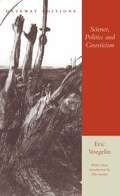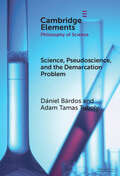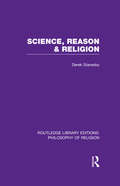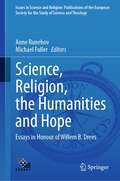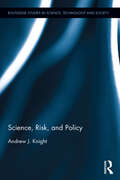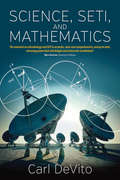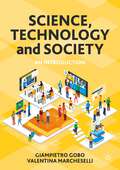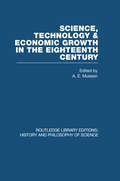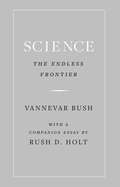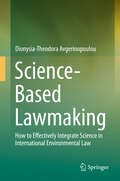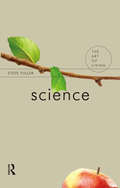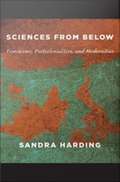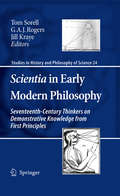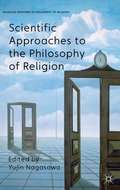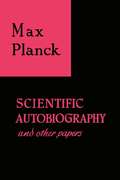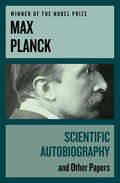- Table View
- List View
Science, Freedom, Democracy (Routledge Studies in the Philosophy of Science)
by Péter HartlThis book addresses the complex relationship between the values of liberal democracy and the values associated with scientific research. The chapters explore how these values mutually reinforce or conflict with one another, in both historical and contemporary contexts. The contributors utilize various approaches to address this timely subject, including historical studies, philosophical analysis, and sociological case studies. The chapters cover a range of topics including academic freedom and autonomy, public control of science, the relationship between scientific pluralism and deliberative democracy, lay-expert relations in a democracy, and the threat of populism and autocracy to scientific inquiry. Taken together the essays demonstrate how democratic values and the epistemic and non-epistemic values associated with science are interconnected. Science, Freedom, Democracy will be of interest to scholars and graduate students working in philosophy of science, history of philosophy, sociology of science, political philosophy, and epistemology.
Science, Humanism, and Religion: The Quest for Orientation (Studies in Humanism and Atheism)
by Matthias JungIn the human quest for orientation vis-à-vis personal life and comprehensive reality the worldviews of religionists and humanists offer different answers, and science also plays a crucial role. Yet it is the ordinary, embodied experience of meaningful engagement with reality in which all these cultural activities are rooted. Human beings have to relate themselves to the entirety of their lives to achieve orientation. This relation involves a non-methodical, meaningful experience that exhibits the crucial features for understanding worldviews: it comprises cognition, volition, and emotion, is embodied, action-oriented, and expressive. From this starting-point, religious and secular worldviews articulate what is experienced as ultimately meaningful. Yet the plurality and one-sidedness of these life stances necessitates critical engagement for which philosophy provides indispensable means. In the end, some worldviews can be ruled out, but we are still left with a plurality of genuine options for orientation.
Science, Man and Morals
by W. H. ThorpeOriginally published in 1965 and written by one of the world’s leading experts in animal behaviour, this book was written just as the impact of DNA on biology, genetics ethology and biophysics was being felt. The book reviews these developments and analyses the affect they have on our view of our own nature and of ethical and moral sense. It is particularly concerned with the impact of DNA and genetics on philosophic thought.
Science, Medicine, and the Aims of Inquiry: A Philosophical Analysis
by Somogy VargaAfter its unparalleled rise and expansion over the past century, medicine is increasingly criticized both as a science and clinical practice for lacking scientific rigor, for contributing to overmedicalization, and for failing to offer patient-centered care. This criticism highlights serious challenges which indicate that the scope and societal role of medicine are likely to be altered in the 21st century. Somogy Varga's ground-breaking book offers a new perspective on the challenges, showing that they converge on fundamental philosophical questions about the nature and aim of medicine. Addressing these questions, Varga presents a philosophical examination of the norms and values constitutive of medicine and offers new perspectives on how to address the challenges that the criticism raises. His book will offer valuable input for rethinking the agenda of medical research, health care delivery, and the education of health care personnel.
Science, Method, and Argument in Galileo: Philosophical, Historical, and Historiographical Essays (Argumentation Library #40)
by Maurice A. FinocchiaroThis book collects a renowned scholar's essays from the past five decades and reflects two main concerns: an approach to logic that stresses argumentation, reasoning, and critical thinking and that is informal, empirical, naturalistic, practical, applied, concrete, and historical; and an interest in Galileo’s life and thought—his scientific achievements, Inquisition trial, and methodological lessons in light of his iconic status as “father of modern science.” These republished essays include many hard to find articles, out of print works, and chapters which are not available online. The collection provides an excellent resource of the author's lifelong dedication to the subject. Thus, the book contains critical analyses of some key Galilean arguments about the laws of falling bodies and the Copernican hypothesis of the earth’s motion. There is also a group of chapters in which Galileo’s argumentation is compared and contrasted with that of other figures such as Socrates, Karl Marx, Giordano Bruno, and his musicologist father Vincenzo Galilei. The chapters on Galileo’s trial illustrate an approach to the science-vs-religion issue which Finocchiaro labels “para-clerical” and conceptualizes in terms of a judicious consideration of arguments for and against Galileo and the Church. Other essays examine argumentation about Galileo’s life and thought by the major Galilean scholars of recent decades. The book will be of interest to scholars in philosophy, logic, philosophy of science, history of science, history of religion, philosophy of religion, argumentation, rhetoric, and communication studies.
Science, Numbers and Politics
by Markus J. PrutschThis study explores the dynamic relationship between science, numbers and politics. What can scientific evidence realistically do in and for politics? The volume contributes to that debate by focusing on the role of “numbers” as a means by which knowledge is expressed and through which that knowledge can be transferred into the political realm. Based on the assumption that numbers are constantly being actively created, translated, and used, and that they need to be interpreted in their respective and particular contexts, it examines how numbers and quantifications are made ‘politically workable’, examining their production, their transition into the sphere of politics and their eventual use therein. Key questions that are addressed include: In what ways does scientific evidence affect political decision-making in the contemporary world? How and why did quantification come to play such an important role within democratic politics? What kind of work do scientific evidence and numbers do politically?
Science, Order and Creativity
by F. David Peat David BohmOne of the foremost scientists and thinkers of our time, David Bohm worked alongside Oppenheimer and Einstein. In Science, Order and Creativity he and physicist F. David Peat propose a return to greater creativity and communication in the sciences. They ask for a renewed emphasis on ideas rather than formulae, on the whole rather than fragments, and on meaning rather than mere mechanics. Tracing the history of science from Aristotle to Einstein, from the Pythagorean theorem to quantum mechanics, the authors offer intriguing new insights into how scientific theories come into being, how to eliminate blocks to creativity and how science can lead to a deeper understanding of society, the human condition and the human mind itself. Science, Order and Creativity looks to the future of science with elegance, hope and enthusiasm.
Science, Policy, And The Value-free Ideal
by Heather DouglasThe role of science in policymaking has gained unprecedented stature in the United States, raising questions about the place of science and scientific expertise in the democratic process. Some scientists have been given considerable epistemic authority in shaping policy on issues of great moral and cultural significance, and the politicizing of these issues has become highly contentious. Since World War II, most philosophers of science have purported the concept that science should be “value-free.” In Science, Policy and the Value-Free Ideal, Heather E. Douglas argues that such an ideal is neither adequate nor desirable for science. She contends that the moral responsibilities of scientists require the consideration of values even at the heart of science. She lobbies for a new ideal in which values serve an essential function throughout scientific inquiry, but where the role values play is constrained at key points, thus protecting the integrity and objectivity of science. In this vein, Douglas outlines a system for the application of values to guide scientists through points of uncertainty fraught with moral valence. Following a philosophical analysis of the historical background of science advising and the value-free ideal, Douglas defines how values should-and should not-function in science. She discusses the distinctive direct and indirect roles for values in reasoning, and outlines seven senses of objectivity, showing how each can be employed to determine the reliability of scientific claims. Douglas then uses these philosophical insights to clarify the distinction between junk science and sound science to be used in policymaking. In conclusion, she calls for greater openness on the values utilized in policymaking, and more public participation in the policymaking process, by suggesting various models for effective use of both the public and experts in key risk assessments.
Science, Politics and Gnosticism: Two Essays (The Collected Works Of Eric Voegelin Series #5)
by Eric VoegelinThis concise classic is the most accessible work in the canon of one of the 20th century'sgreatest political scientists. Eric Voegelin here contends that certain modern movements, including Positivism, Hegelianism, Marxism, and the "God is Dead" movement, are variants of the Gnostic tradition of antiquity. Highly provocative, this book is essential reading for students of modern politics, philosophy, and religion. <P><P>Hailed by the American Political Science Review as "one of the most distinguished interpreters to Americans of the non-liberal streams of European thought," Professor Voegelin was director of the Institute for Political Science at the University of Munich as well as professor of political science and lecturer at numerous universities in the United States and Europe. <P><P>With a new introduction by Ellis Sandoz, professor of political science at Lousiana State University and director of the Eric Voegelin Institute for American Renasissance Studies.
Science, Pseudoscience, and the Demarcation Problem (Elements in the Philosophy of Science)
by Adam Tamas Tuboly Dániel BárdosThis Element examines various aspects of the demarcation problem: finding a distinction between science and pseudoscience. Section 1 introduces issues surrounding pseudoscience in the recent literature. Popper's falsificationism is presented in Section 2, alongside some of its early critics, such as Thomas Kuhn and Imre Lakatos. It is followed in Section 3 by the notable criticism of the Popperian program by Larry Laudan that put the issue out of fashion for decades. Section 4 explores recent multi-criteria approaches that seek to define pseudoscience not only along a single criterion, but by considering the diversity and historical dimension of science. Section 5 introduces the problem of values (the 'new demarcation problem') and addresses how we can use values in the problem of pseudoscience. Finally, Section 6 concludes by emphasizing the need for an attitude-oriented approach over a rigid, method-based demarcation, recognizing scientific practice's evolving and multifaceted nature.
Science, Reason and Religion (Routledge Library Editions: Philosophy of Religion)
by Derek StanesbyPhilosophy matters. This is the message of this highly original inquiry into the relationship between science and religion. It is only when we examine the intellectual presuppositions on which science and religion are based, with regard to such fundamentals as truth, objectivity, and realism, that we perceive the link between these two enterprises which are essential to any characterization of man. The book offers a lucid and enlightening account of the main movements in the philosophy of science in the twentieth century, and then proceeds to demonstrate their consequences for philosophy of religion. After examining the wide and all-pervasive influence of positivism, and its offspring relativism, in both science and theology, he suggests that the attempt to provide an alternative, made by Karl Popper, offers the most satisfactory way forward in man’s twofold enquiry in terms of his relationship with God and with the world.
Science, Religion, the Humanities and Hope: Essays in Honour of Willem B. Drees (Issues in Science and Religion: Publications of the European Society for the Study of Science and Theology #8)
by Michael Fuller Anne RunehovThis book collects a multidisciplinary range of contributions focusing on the prolific and seminal work of Willem Drees in the fields of philosophy of religion, philosophy of the humanities, and science and theology/religion. Trained in both theoretical physics and theology/philosophy of religion, Drees holds doctoral degrees in both theology and in philosophy and, amongst other distinguished positions, held professorships at the University of Leiden and at the University of Tilburg. Drees was also Editor-in-Chief of Zygon, Journal of Religion & Science, between 2008 and 2018, and served as President of the European Society for the Study of Science and Theology (ESSSAT) between 2002 and 2008. In 2018, he was elected as member of the Royal Holland Society of Sciences and Humanities (KHMW). This contributed volume builds on Drees’ expansive and provocative scholarly contributions, notably around the concept and meaning of naturalism and the humanities to the fields of science and religion, as exemplified by his works Religion, Science and Naturalism (1996) and What Are the Humanities For? (2021). In a time where more and more young people across the globe are entering higher education such cross-disciplinary explorations and (re-)evaluations are vital to the field. Accordingly, by approaching his work from a variety of disciplines this collection illuminates the broad reach of Drees’ work and provides scholars from various fields with many new and rich opportunities avenues for research.
Science, Risk, and Policy (Routledge Studies in Science, Technology and Society #32)
by Andrew J. KnightFor decades, experts and the public have been at odds over the nature and magnitude of risks and how they should be mitigated through policy. Experts argue that the fears of the public are irrational, and that public policy should be based on sound science. The public, on the other hand, is skeptical of experts, and believe policy should represent their interests. How do policy analysts make sense of these competing views? Science, Risk and Policy answers this question by examining how people evaluate evidence, how science is conducted, and how a multi-disciplinary framework to risk can inform policy by bridging the gap between experts and the public. This framework is then applied to four case studies: pesticides, genetically engineered foods, climate change, and nuclear power. By tracing the history of the science, policies and regulations, and evaluating arguments made about these risks, Andrew J. Knight provides a guide to understand how experts and the public view risks.
Science, Seti, and Mathematics
by Carl L. DeVitoMathematics is as much a part of our humanity as music and art. And it is our mathematics that might be understandable, even familiar, to a distant race and might provide the basis for mutual communication. This book discusses, in a conversational way, the role of mathematics in the search for extraterrestrial intelligence. The author explores the science behind that search, its history, and the many questions associated with it, including those regarding the nature of language and the philosophical/psychological motivation behind this search.
Science, Technology and Society
by Martin Bridgstock Ian Lowe David Burch John Forge John LaurentThis book provides a comprehensive introduction to the human, social and economic aspects of science and technology. It examines a broad range of issues from a variety of perspectives, using examples and experiences from around the world. The authors present complex issues, including the responsibilities of scientists, ethical dilemmas and controversies, the Industrial Revolution, economic issues, public policy, and science and technology in developing countries. The book ends with a thoughtful and provocative look toward the future. It features extensive guides to further reading, as well as a useful section on information searching skills. This book will provoke, engage, inform and stimulate thoughtful discussion about culture, society and science. Broad and interdisciplinary, it will be of considerable value to both students and teachers.
Science, Technology and Society: An Introduction
by Giampietro Gobo Valentina MarcheselliScience, Technology and Society: An Introduction provides students with an accessible overview of the interdisciplinary field of Science and Technology Studies (STS). The discipline breaks down traditional conceptions of knowledge as universal, neutral and ahistorical, and takes a more critical approach to science and technology as social embedded phenomena. This comprehensive textbook makes use of unique examples and case studies to illustrate theoretical debates and concepts. In addition, the reader acquires a unique vision of contemporary issues (such as the power of algorithms, the mystification of fake news, the role of experts within the decision-making process, for example). Each chapter incorporates pedagogically rich features, including interactive discussion points to be used individually or in class as prompts for debate.
Science, technology and economic growth in the eighteenth century
by A E MussonOriginally published in 1972.This book illustrates the growing awareness of the importance of science and technology in the Industrial Revolution. The contributors show that the growth in the teaching and literature of natural philosophy (mechanics, hydraulics etc), mathematics and chemistry, together with such new agencies as "philosophical societies", itinerant lecturers and libraries were significant factors in the development of the Industrial Revolution.
Science, the Endless Frontier: A Report To The President (Three Centuries Of Science In America Ser.)
by Vannevar BushThe classic case for why government must support science—with a new essay by physicist and former congressman Rush Holt on what democracy needs from science todayScience, the Endless Frontier is recognized as the landmark argument for the essential role of science in society and government’s responsibility to support scientific endeavors. First issued when Vannevar Bush was the director of the US Office of Scientific Research and Development during the Second World War, this classic remains vital in making the case that scientific progress is necessary to a nation’s health, security, and prosperity. Bush’s vision set the course for US science policy for more than half a century, building the world’s most productive scientific enterprise. Today, amid a changing funding landscape and challenges to science’s very credibility, Science, the Endless Frontier resonates as a powerful reminder that scientific progress and public well-being alike depend on the successful symbiosis between science and government.This timely new edition presents this iconic text alongside a new companion essay from scientist and former congressman Rush Holt, who offers a brief introduction and consideration of what society needs most from science now. Reflecting on the report’s legacy and relevance along with its limitations, Holt contends that the public’s ability to cope with today’s issues—such as public health, the changing climate and environment, and challenging technologies in modern society—requires a more capacious understanding of what science can contribute. Holt considers how scientists should think of their obligation to society and what the public should demand from science, and he calls for a renewed understanding of science’s value for democracy and society at large.A touchstone for concerned citizens, scientists, and policymakers, Science, the Endless Frontier endures as a passionate articulation of the power and potential of science.
Science-Based Lawmaking: How to Effectively Integrate Science in International Environmental Law
by Dionysia-Theodora AvgerinopoulouThe Book takes the approach of a critique of the prevailing international environmental law-making processes and their systemic shortcomings. It aims to partly redesign the current international environmental law-making system in order to promote further legislation and more effectively protect the natural environment and public health. Through case studies and doctrinal analyses, an array of initial questions guides the reader through a variety of factors influencing the development of International Environmental Law. After a historical analysis, commencing from the Platonic philosophy up to present, the Book holds that some of the most decisive factors that could create an optimized law-making framework include, among others: progressive voting processes, science-based secondary international environmental legislation, new procedural rules, that enhance the participation in the law-making process by both experts and the public and also review the implementation, compliance and validity of the science-base of the laws. The international community should develop new law-making procedures that include expert opinion. Current scientific uncertainties can be resolved either by policy choices or by referring to the so-called „sound science.“ In formulating a new framework for environmental lawmaking processes, it is essential to re-shape the rules of procedure, so that experts have greater participation in those, in order to improve the quality of International Environmental Law faster than the traditional processes that mainly embrace political priorities generated by the States. Science serves as one of the main tools that will create the next generation of International Environmental Law and help the world transition to a smart, inclusive, sustainable future.
Science: The Struggle For The Soul Of Science (The Art of Living)
by Steve FullerIn this challenging and provocative book, Steve Fuller contends that our continuing faith in science in the face of its actual history is best understood as the secular residue of a religiously inspired belief in divine providence. Our faith in science is the promise of a life as it shall be, as science will make it one day. Just as men once put their faith in God's activity in the world, so we now travel to a land promised by science. In "Science", Fuller suggests that the two destinations might be the same one. Fuller sympathetically explores what it might mean to live scientifically. Can science give a sense of completeness to one's life? Can it account for the entirety of what it is to be human? And what does our continuing belief in scientific progress say about us as a species? In answering these questions, Fuller ranges widely over the history of science and religion - from Aristotle and the atomists to Dawkins and the neo-Darwinists - and takes a close look at what science is, how its purpose has changed over the years, and what role religion and in more recent years atheism have played in its progression. Science, argues Fuller, is now undergoing its own version of secularization. We are ceasing to trust science in its institutional forms, formulated by an anointed class of science priests, and instead we are witnessing the emergence of what Fuller calls Protscience' - all sorts of people, from the New Age movement to anti-evolutionists, claiming scientific authority as their own. Fuller shows that these groups are no more anti-scientific than Protestant sects were atheistic. Fearless and thought-provoking, Science questions some of our most fundamental beliefs about the nature and role of science, and is a distinct and important contribution to debates about evolution, intelligent design, atheism, humanism, the notion of scientific progress, and the public understanding of science.
Sciences from Below: Feminisms, Postcolonialities, and Modernities
by Sandra HardingIn Sciences from Below, the esteemed feminist science studies scholar Sandra Harding synthesizes modernity studies with progressive tendencies in science and technology studies to suggest how scientific and technological pursuits might be more productively linked to social justice projects around the world. Harding illuminates the idea of multiple modernities as well as the major contributions of post-Kuhnian Western, feminist, and postcolonial science studies. She explains how these schools of thought can help those seeking to implement progressive social projects refine their thinking to overcome limiting ideas about what modernity and modernization are, the objectivity of scientific knowledge, patriarchy, and Eurocentricity. She also reveals how ideas about gender and colonialism frame the conventional contrast between modernity and tradition. As she has done before, Harding points the way forward in Sciences from Below. Describing the work of the post-Kuhnian science studies scholars Bruno Latour, Ulrich Beck, and the team of Michael Gibbons, Helga Nowtony, and Peter Scott, Harding reveals how, from different perspectives, they provide useful resources for rethinking the modernity versus tradition binary and its effects on the production of scientific knowledge. Yet, for the most part, they do not take feminist or postcolonial critiques into account. As Harding demonstrates, feminist science studies and postcolonial science studies have vital contributions to make; they bring to light not only the male supremacist investments in the Western conception of modernity and the historical and epistemological bases of Western science but also the empirical knowledge traditions of the global South. Sciences from Below is a clear and compelling argument that modernity studies and post-Kuhnian, feminist, and postcolonial sciences studies each have something important, and necessary, to offer to those formulating socially progressive scientific research and policy.
Scientia in Early Modern Philosophy
by Tom Sorell Jill Kraye G. A. RogersScientia is the term that early modern philosophers applied to a certain kind of demonstrative knowledge, the kind whose starting points were appropriate first principles. In pre-modern philosophy, too, scientia was the name for demonstrative knowledge from first principles. But pre-modern and early modern conceptions differ systematically from one another. This book offers a variety of glimpses of this difference by exploring the works of individual philosophers as well as philosophical movements and groupings of the period. Some of the figures are transitional, falling neatly on neither side of the allegiances usually marked by the scholastic/modern distinction. Among the philosophers whose views on scientia are surveyed are Hobbes, Descartes, Spinoza, Gassendi, Locke, and Jungius. The contributors are among the best-known and most influential historians of early modern philosophy.
Scientific Approaches to the Philosophy of Religion
by Yujin NagasawaThe philosophy of religion, one of the oldest areas of philosophy, has been advanced mainly through conceptual thinking. However, over the last few decades scientists have made discoveries with significant implications for this philosophical domain. Scientific Approaches to Philosophy of Religion opens new perspectives by applying scientific approaches to central problems in the field. The book's contributors tackle perennial problems in philosophy of religion by referring to relevant findings and theories in cognitive science, anthropology, developmental psychology, decision theory, biology, physics and cosmology. They address a wide range of topics, such as divine attributes; God, creation and evolution; God and the universe; religious beliefs; religious tolerance and disagreement; and the compatibility of science and religion.
Scientific Autobiography and Other Papers
by Max PlanckIn this fascinating autobiography from the foremost genius of twentieth-century physics, Max Planck tells the story of his life, his aims, and his thinking. Published posthumously, the papers in this volume were written for the general reader and make accessible his scientific theories as well as his philosophical ideals, including his thoughts on ethics and morals. Max (Karl Ernst Ludwig) Planck was a German physicist and philosopher known for his quantum theory, for which he won the Nobel Prize in Physics in 1918. Planck was born in Kiel, Germany, in 1858 to an academic family, and he valued education from a young age. He attended the Universities of Munich and Berlin to study physics under the great scientific leaders Kirchhoff and Helmholtz. His early work mainly focused on the study of thermodynamics, and in 1900 he published a paper on his quantum theory that would change the face of modern physics. Planck worked as a professor at Berlin University his entire life, and he also served as the president of the Kaiser Wilhelm Society for the Promotion of Science. During World War II, Planck experienced great hardships while he remained in Germany but openly opposed the Nazi regime. One of his two sons was executed during this time for an unsuccessful attempt on Hitler’s life, and Planck’s home in Berlin was eventually bombed. He continued to write on physics and philosophy until his death in 1947.
Scientific Autobiography: And Other Papers
by Max PlanckIn this fascinating autobiography from one of the foremost geniuses of twentieth-century physics, Max Planck tells the story of his life, his aims, and his thinking. Published posthumously, the papers in this volume were written for the general reader and make accessible Planck&’s scientific theories as well as his philosophical ideals, including his thoughts on ethics and morals.
